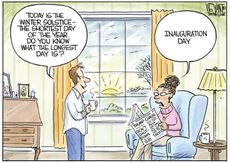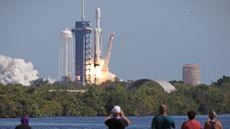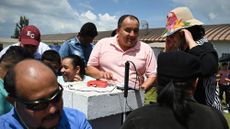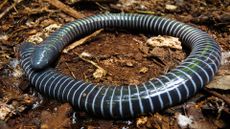Arlington National Cemetery is running out of room


Unless the Army comes up with strict new rules about who can be buried at Arlington National Cemetery, the final resting place of hundreds of thousands of veterans and their families will be completely full in 25 years.
Every year, about 7,000 people are buried at the cemetery, where 420,000 veterans and their relatives are already interred. The Army wants to be able to bury people at Arlington for 150 more years, but it can't get any bigger because of highways and development. One proposal is extremely strict: Allow burials only for service members killed in action or those who have received the Medal of Honor, The New York Times reports.
Right now, Arlington is open to veterans who have served long enough to retire from the military; troops who were wounded in battle, given the three highest awards for valor, or died while on active duty; prisoners of war; and civilians who held high-level government posts, plus their spouses and dependents. "I don't know if it's fair to go back on a promise to an entire population of veterans," John Towles, legislative deputy director for Veterans of Foreign Wars, told the Times. "Let Arlington fill up with people who have served their country. We can create a new cemetery that, in time, will be just as special." The Army is conducting a survey of public opinion, and will make formal recommendations this fall.
Subscribe to The Week
Escape your echo chamber. Get the facts behind the news, plus analysis from multiple perspectives.

Sign up for The Week's Free Newsletters
From our morning news briefing to a weekly Good News Newsletter, get the best of The Week delivered directly to your inbox.
From our morning news briefing to a weekly Good News Newsletter, get the best of The Week delivered directly to your inbox.
Sign up for Today's Best Articles in your inbox
A free daily email with the biggest news stories of the day – and the best features from TheWeek.com
Catherine Garcia has worked as a senior writer at The Week since 2014. Her writing and reporting have appeared in Entertainment Weekly, The New York Times, Wirecutter, NBC News and "The Book of Jezebel," among others. She's a graduate of the University of Redlands and the Columbia University Graduate School of Journalism.
-
 Today's political cartoons - December 22, 2024
Today's political cartoons - December 22, 2024Cartoons Sunday's cartoons - the long and short of it, trigger finger, and more
By The Week US Published
-
 5 hilariously spirited cartoons about the spirit of Christmas
5 hilariously spirited cartoons about the spirit of ChristmasCartoons Artists take on excuses, pardons, and more
By The Week US Published
-
 Inside the house of Assad
Inside the house of AssadThe Explainer Bashar al-Assad and his father, Hafez, ruled Syria for more than half a century but how did one family achieve and maintain power?
By The Week UK Published
-
 US won its war on 'murder hornets,' officials say
US won its war on 'murder hornets,' officials saySpeed Read The announcement comes five years after the hornets were first spotted in the US
By Peter Weber, The Week US Published
-
 Dark energy data suggest Einstein was right
Dark energy data suggest Einstein was rightSpeed Read Albert Einstein's 1915 theory of general relativity has been proven correct, according to data collected by the Dark Energy Spectroscopic Instrument
By Peter Weber, The Week US Published
-
 New DNA tests of Pompeii dead upend popular stories
New DNA tests of Pompeii dead upend popular storiesSpeed Read An analysis of skeletal remains reveals that some Mount Vesuvius victims have been wrongly identified
By Peter Weber, The Week US Published
-
 NASA's Europa Clipper blasts off, seeking an ocean
NASA's Europa Clipper blasts off, seeking an oceanSpeed Read The ship is headed toward Jupiter on a yearslong journey
By Peter Weber, The Week US Published
-
 Detailed map of fly's brain holds clues to human mind
Detailed map of fly's brain holds clues to human mindSpeed Read This remarkable fruit fly brain analysis will aid in future human brain research
By Peter Weber, The Week US Published
-
 Blind people will listen to next week's total eclipse
Blind people will listen to next week's total eclipseSpeed Read While they can't see the event, they can hear it with a device that translates the sky's brightness into music
By Peter Weber, The Week US Published
-
 Melting polar ice is messing with global timekeeping
Melting polar ice is messing with global timekeepingSpeed Read Ice loss caused by climate change is slowing the Earth's rotation
By Peter Weber, The Week US Published
-
 An amphibian that produces milk?
An amphibian that produces milk?speed read Caecilians, worm-like amphibians that live underground, produce a milk-like substance for their hatchlings
By Peter Weber, The Week US Published